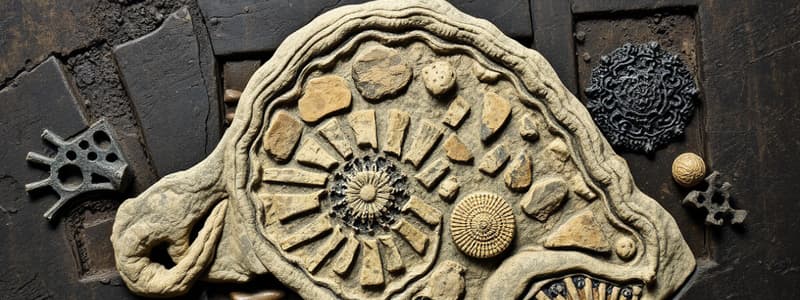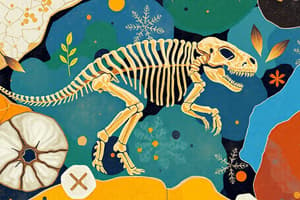Podcast
Questions and Answers
What type of fossil consists of actual remains of the organism?
What type of fossil consists of actual remains of the organism?
Which process is crucial for the formation of fossils by protecting remains from decay?
Which process is crucial for the formation of fossils by protecting remains from decay?
What is the study of ancient ecosystems through fossils known as?
What is the study of ancient ecosystems through fossils known as?
Which type of fossil forms when sediment fills a mold and hardens?
Which type of fossil forms when sediment fills a mold and hardens?
Signup and view all the answers
What is the term for fossils that help to date the rock layers in which they are found?
What is the term for fossils that help to date the rock layers in which they are found?
Signup and view all the answers
What challenge in fossil study involves the study of how organisms decay and become fossilized?
What challenge in fossil study involves the study of how organisms decay and become fossilized?
Signup and view all the answers
Which fossil site is significant for Ice Age fossils?
Which fossil site is significant for Ice Age fossils?
Signup and view all the answers
What is the best description of a mold fossil?
What is the best description of a mold fossil?
Signup and view all the answers
Study Notes
Definition
- Fossils are preserved remains, impressions, or traces of organisms from the past.
Types of Fossils
- Body Fossils: Actual remains of the organism (e.g., bones, shells).
- Trace Fossils: Evidence of organismal activity (e.g., footprints, burrows).
- Molds and Casts:
- Mold: Impression left in sediment.
- Cast: Formed when sediment fills a mold and hardens.
- Amber Fossils: Organisms trapped in tree resin that hardens into amber.
- Petrified Fossils: Organic material replaced by minerals, turning into rock.
Formation Process
- Requires specific conditions:
- Rapid Burial: Protects remains from decay and scavengers.
- Sedimentation: Layers of sediment accumulate, providing pressure.
- Mineralization: Organic materials are replaced by minerals over time.
- Time: Geological processes over millions of years lead to fossilization.
Importance of Fossils
- Paleontology: Study of fossils to understand Earth's history and evolution.
- Climatic Insights: Provides evidence of past climates and environments.
- Evolutionary Evidence: Shows the progression and extinction of species over time.
- Geological Dating: Used to date rock layers through relative dating and index fossils.
Notable Fossil Sites
- La Brea Tar Pits: Rich in Ice Age fossils.
- Burgess Shale: Significant for Cambrian marine fossils.
- Solnhofen Limestone: Famous for fossilized Archaeopteryx.
Challenges in Fossil Study
- Incomplete Record: Not all organisms fossilize; soft-bodied organisms are less likely to leave fossils.
- Taphonomy: Study of how organisms decay and become fossilized; complex processes can alter fossils.
- Interpretation: Fossils may be misinterpreted without proper context.
Key Terms
- Paleoecology: Study of ancient ecosystems through fossils.
- Index Fossils: Fossils that are used to identify and date the strata in which they are found.
- Stratigraphy: Study of rock layers (strata) and layering (sedimentation).
Definition of Fossils
- Fossils preserve remains, impressions, or traces of ancient organisms.
Types of Fossils
- Body Fossils: Include bones, shells, and other actual remains of organisms.
- Trace Fossils: Document activities of organisms, such as footprints and burrows.
- Molds and Casts:
- Mold: An impression formed in sediment.
- Cast: Created when sediment fills a mold and hardens, forming a replica.
- Amber Fossils: Organisms preserved in tree resin that later solidifies into amber.
- Petrified Fossils: Organic materials that have been replaced by minerals, transforming into rock.
Fossil Formation Process
- Fossilization demands specific conditions:
- Rapid Burial: Protects organic remains from decay and scavengers.
- Sedimentation: Accumulating layers of sediment provide necessary pressure.
- Mineralization: Organic material gradually replaced by minerals over time.
- Time: Geological processes involve millions of years for proper fossil development.
Importance of Fossils
- Paleontology: The study of fossils reveals insights into Earth's history and biological evolution.
- Climatic Insights: Fossils inform scientists about past climates and ecosystems.
- Evolutionary Evidence: Document the progression and extinction of species through geological time.
- Geological Dating: Fossils help date rock layers using relative dating methods and index fossils.
Notable Fossil Sites
- La Brea Tar Pits: Known for abundant Ice Age fossils.
- Burgess Shale: Renowned for significant Cambrian marine fossils.
- Solnhofen Limestone: Famous for preserving the fossilized remains of Archaeopteryx.
Challenges in Fossil Study
- Incomplete Record: Not all organisms leave fossils; soft-bodied ones are particularly underrepresented.
- Taphonomy: The complex processes affecting decay and preservation can alter fossil integrity.
- Interpretation Issues: Fossils require proper context to avoid misinterpretation.
Key Terms
- Paleoecology: The study of ancient ecosystems through fossil evidence.
- Index Fossils: Specific fossils used in identifying and dating geological strata.
- Stratigraphy: The scientific study of rock layers (strata) and their formation through sedimentation.
Studying That Suits You
Use AI to generate personalized quizzes and flashcards to suit your learning preferences.
Description
This quiz delves into the fascinating world of fossils, exploring their types, formation processes, and significance in the study of paleontology. Test your knowledge on body fossils, trace fossils, amber fossils, and more. Enhance your understanding of how fossils provide insights into past organisms and ecosystems.




